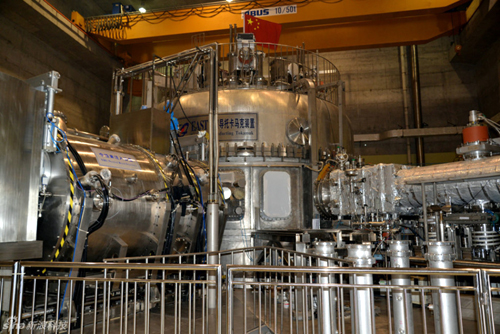Time for China to innovate
- By Zhang Rui
 0 Comment(s)
0 Comment(s) Print
Print E-mail China.org.cn, November 11, 2013
E-mail China.org.cn, November 11, 2013
|
|
|
Experimental Advanced Superconducting Tokamak, also known as "artificial sun", has been designed by the Institute of Plasma Physics at the Chinese Academy of Sciences in Hefei, central China. Just like the real sun, the "artificial sun" can generate electricity and help to solve the present global energy crisis. [Photo: tech.sina.com.cn] |
On Oct. 1, China's National Day, the country's top leadership met for a group study at a Beijing technology hub at the Zhongguancun Science Park, known as China's Silicon Valley. During the session, Chinese President Xi Jinping stressed the importance of science and technology in strengthening China, saying that innovation is a global trend.
"We must enhance awareness of unexpected challenges and grab the opportunity of the science and technology revolution. We cannot wait, hesitate or slacken our efforts," he said.
China's development has reached a crossroads. Reform and innovation are vital for the country to continue to develop, whether such innovation is forced by need or comes about organically. China's top leaders are gathering in Beijing for the four-day meeting known as the Third Plenary Session of the 18th Central Committee of the Communist Party of China (CPC), to establish a blueprint to implement the innovation-driven development put forward by the 18th CPC National Congress in November 2012.
"Real innovation has to come from the needs of users and people. There are many concepts of innovation nowadays, but many of them are nonsense!" Li Liang, an engineer with the Third Research Academy of China Aerospace Science and Technology Corporation (CASIC), told China.org.cn on Sunday,
China has become known as the "factory of the world" for its flourishing manufacturing and export businesses, but intellectual property rights (IPR) infringements and the country's reputation for producing "copycat" products are damaging China's international reputation.
In the first half of 2013, 2,176 people were arrested for IPR infringements in China, according to the Supreme People's Procuratorate.
"Innovation" was one of the keywords in former President Hu Jintao's report at the 18th National Congress. It was mentioned 57 times, with regard to technology, culture, management, finance, talent training and systems.
"Scientific and technological innovation provides strategic support for increasing productivity and boosting China's overall national strength. We must give it top priority in our national development," the report stated.
Minister of Finance Lou Jiwei said on Oct. 22 in a report to the country's top legislature that even though China has invested heavily in science and technology, it is questionable how effective this has been.
According to media reports, China's research and development spending reached 1 trillion yuan (US$164.1 billion) in 2012. Seventy four percent of the funding came from enterprises. By 2012, there were 3.2 million people working in scientific research and development, the largest number of any country in the world.
How effective this funding is will be hugely significant, now that China is upgrading its industries. Lou said the science and technology evaluation system and management of funds in the sector should be improved. There is a lack of coordination between departments in the science and technology funding system, and relations between the government and the market have not been clearly defined, which has reduced the impact of funding.
There are a series of challenges on the road ahead, from the labor cost rise and insufficient resources to environmental degradation. However, some developed countries find China's rise hard to accept and have tried to block hi-tech trade, exchange and cooperation, which is also holding China's innovation back. One recent example is the controversial China-Turkey missile defense deal.
Despite the difficulties ahead, "scientific innovation will increase productivity, which will encourage reform of productive relations and the superstructure," said Wan Gang, Minister of Science and Technology. Scientific innovation will lead to new a business model and market, then eventually to economic reform.
The 18th CPC National Congress report has mapped out ways to nurture innovation, including establishing a system for technological innovation in which enterprises play the leading role. "The market should point the way," the report said, "and enterprises, universities and research institutes should work together. We should improve the knowledge-based innovation system, and strengthen basic research, research into avant-garde technologies, and public benefit-oriented research and development. We should improve research and apply the results to production to ensure that we can take a leading strategic position in research and development. "
"We should allocate innovation resources efficiently and integrate them fully, and ensure that the wisdom and strength of the whole of society is directed towards promoting innovation-driven development," the report said.
As China embarks on a new journey under the new leadership and the Third Plenary Session is posed to make major decisions, "innovation" is one of the keywords that will define the new era.







Go to Forum >>0 Comment(s)